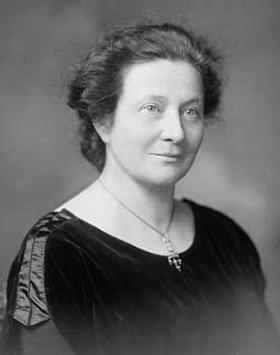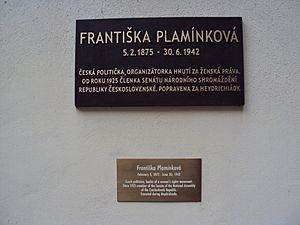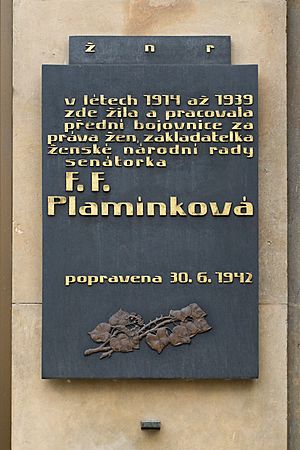Františka Plamínková facts for kids
Františka Plamínková (1875–1942) was a brave Czech woman who fought for equal rights. She was a leading voice for feminism, which means believing in equality for women. She also worked hard for suffrage, which is the right to vote.
Františka started her career as a teacher. She became a feminist because teachers were not allowed to marry. She then became a journalist, writing articles about how unfair things were for women. Later, she was elected to the Prague City Council and the National Assembly. She even led the Senate when Czechoslovakia became an independent country.
Františka was also a leader in international women's groups. She was a vice president of the International Council of Women and the International Woman's Suffrage Alliance. She went to many meetings around the world to talk about women's rights. Sadly, Františka Plamínková was arrested in 1942 and killed.
Contents
Františka Plamínková's Early Life
Františka Faustina Plamínková was born on February 5, 1875, in Prague, which was part of Austria-Hungary at the time. Her parents were Františka and František Plamínek. Her father was a cobbler, which is someone who makes or repairs shoes. She was the youngest of three daughters. After finishing her basic schooling, she went to the Prague State Teachers' Institute to become a teacher.
Becoming a Teacher and Fighting for Women's Rights
Františka Plamínková started teaching in 1894. She taught in different schools before moving back to Prague in 1895. By 1900, she was fully certified to teach many subjects, including drawing, math, physics, and writing.
She joined the Association of Czech Teachers. This is where she started speaking out against an unfair law. This law in Austria-Hungary said that teachers could not get married and had to stay single. Františka believed this was wrong.
In 1901, Plamínková started the Women's Club in Prague. Four years later, she created the Committee for Women's Suffrage. This group worked to get women the right to vote. Františka was a key leader in this fight in the Czech lands. She helped people understand why voting rights were so important.
At their rallies, women also supported the right for all men to vote. At that time, the Habsburg rulers denied many people the right to vote. In 1907, men were given the right to vote in national elections, but women were still left out.
Františka realized that a local law in Bohemia did not actually stop women from running for office at the local level. She convinced several political parties to let women run as candidates. Even though none of them won at first, they kept trying in later elections. This became a symbol of Czech pride and their desire for independence.
In 1912, the first woman, Božena Viková-Kunětická, was elected. However, the governor canceled the election result. Still, this event brought Františka and the Czech feminists international attention. During this time, Františka also traveled around Europe. She even worked as a news reporter during the First Balkan War.
A Politician in the New Czechoslovakia
During World War I, Austria-Hungary tried to control the Czech people and stop their desire for independence. But this only made them want freedom more. Czech leaders living in other countries asked for help from Western Allies to create an independent Czechoslovakia.
The "Washington Declaration" was a very important document. It created the First Czechoslovak Republic. This new country got rid of noble titles, shared land more fairly, and separated church and state. Most importantly, it removed barriers based on social class, gender, and religion. This meant women gained political, social, and cultural equality with men. Because Western Allies made this declaration a condition for peace, women gained voting rights in 1918.
Changes happened very quickly. The unfair law that said teachers could not marry was removed in 1919. Františka Plamínková joined the Czechoslovak Socialist Party. She ran in the first local elections in 1919 and won a seat on the Prague City Council. She then left her teaching job. She was also chosen to represent Czechoslovakia at the League of Nations in Geneva.
At a big meeting of international feminists in Geneva in June 1920, Františka Plamínková shared exciting news. In the first parliamentary election of 1920, more than half of the voters (54%) were women! Also, 12% of local government jobs were filled by women. Out of 302 members in the Chamber of Deputies, 13 were women. And 3 out of 150 Senators were women. This showed how much had changed for women in Czechoslovakia.
By 1923, Františka realized that the government was not making enough changes to the laws to give women full equality. So, she started the Women's National Council (ŽNR). This group worked closely with the International Woman Suffrage Alliance (IWSA) and the International Council of Women (ICW). It quickly became a powerful group that worked to influence laws.
The ŽNR first focused on changing family and marriage laws. They wanted women to have equal legal rights in marriage and divorce. One of Františka's main goals was to make sure women actually received paid maternity leave. Before, women were often threatened with losing their jobs instead of getting the three-month payment. Another important goal was to change the law that said the man was always the head of the household. This law treated women like children and gave them no say in money matters or raising their kids. Františka used her writing skills to help her cause, publishing articles through a publishing house she helped start in 1923.
Leading the Senate
In 1925, Františka Plamínková was elected as a vice president of the ICW. In the same year, she ran in the parliamentary election and won a seat in the Czechoslovak Senate. She kept this job until 1939. By 1930, she was also a vice president of the IWSA and had been re-elected to the Senate.
When the Great Depression caused money problems around the world, the Czech government suggested cutting back on spending. Františka Plamínková saw these ideas as a threat to equality. They wanted to fire working women and cut the pay of couples, whether married or living together. They also wanted to reduce benefits for single people living with their parents. These ideas would affect all jobs, both government and private.
Františka and the ŽNR protested strongly to government leaders in 1933. They hoped to stop these laws. However, the law passed anyway. The government said it was necessary because in hard times, families should not have two jobs when many people had no jobs at all.
Even though she was the chairperson of the Senate in 1936, Františka Plamínková could not get changes to the family laws passed. In 1937, she criticized her own political party and the government. She said they were failing to see women as full citizens, treating them only as daughters, mothers, and wives.
In the same year, Františka learned about how women were treated under the Nazi regime. It became clear to her that women could not have equal public lives under Nazi rule. Her party, the "Czechoslovak National Socialist Party," had changed its name in 1926. But it was important to know that her party had no connection to the German National Socialists (Nazis). Her party wanted a fair system of social, economic, and political equality. It was actually one of the main groups against the Communist Party of Czechoslovakia.
Because she spoke out against the Nazi regime, Františka became a target. In 1938, there was an attempt to remove her from leading the ŽNR, but it failed.
Fighting Back and Her Death
In 1938 and 1939, Adolf Hitler's troops took over most of Czechoslovakia. The Munich Agreement was signed, which allowed this to happen. Františka Plamínková responded by writing an open letter to Hitler. In it, she criticized his rule and how he was taking away people's freedoms.
When she attended a meeting in Copenhagen in 1939, her friends urged her to stay abroad. They were worried for her safety. But she refused, believing she could best help the Czech people from her home country. She was arrested by the Gestapo in 1939 but later released. However, she was watched closely.
The Nazis banned all political parties that opposed them. The "National Partnership" was the only party allowed. They tried to get Františka Plamínková and the ŽNR to support their goals. But she refused. She preferred for her organization to work quietly to bring back rights without joining any political side.
A journalist who supported the Germans wrote an article attacking Františka and the ŽNR. He wrongly said that her silence meant she was against change. Františka was very angry, fearing the article would destroy the women's organization. She planned a series of talks to promote Czech pride. These talks focused on women writers, the Czech language, and culture. Her last talk, about religion, was never given.
Františka Plamínková was arrested again in 1942. This happened after the assassination of a high-ranking Nazi official, Reinhard Heydrich. She was taken to Theresienstadt concentration camp. Records from the Kobylisy Shooting Range confirm that she was shot and killed on June 30, 1942.
Honors and Legacy
In 1936, a Czech composer named Julie Reisserová wrote a song for a female choir called Slavnostní den (which means "Festive Day"). She dedicated this song to Františka Plamínková.
After her death, Františka Plamínková was honored at the first meeting of the IWSA in 1946. In 1950, she was given the Golden Star, the highest award of the Czechoslovak Army's Order for Liberty. In 1992, she received the Order of Tomáš Garrigue Masaryk, which honors Czechs who have made important contributions to human rights.
In February 2016, Google celebrated her 141st birthday with a special drawing called a "Doodle" on their homepage.
See also
 In Spanish: Františka Plamínková para niños
In Spanish: Františka Plamínková para niños




